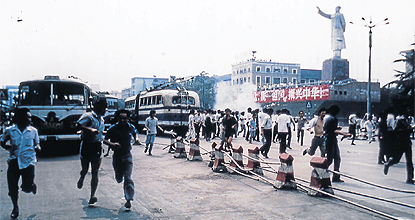China is hurtling towards the top of the world and everybody is watching with bated breath. But what happens when a suffocating one-party political system reaches its limit? What happens when a whole month has been erased from the calendar? And what happens when not only collective happiness is at its peak but also collective amnesia?

The Tiananmen Square protests on June 4, 1989.
Released in January, Koonchung Chan's political science fiction The Fat Years takes a dystopic stab at what could happen in China _ and probably the world _ in the near future and what it would mean for individual freedom. Not surprisingly, the book was banned in China. Elsewhere, we can find a copy, and since tomorrow marks the 24th anniversary of the Tiananmen Square massacre, Chan's novel rings like another timely reminder of the social transformation that's taking place in that country.
The story unfolds in present day Beijing. China has reached a "Golden Age of Ascendancy" that started in 2010, after the US dollar plummeted 30% in a single day.
But the authorities have tampered with time: a 28-day gap between the American collapse and the Chinese ascendency was erased from historical records. Not many people know nor care about that black hole in the Chinese calendar, except a group of colourful dissidents.
The story centres around Old Chen, an established writer in the Beijing cultural circuit, who himself is content to enjoy his nation's success while sipping on his favourite Black Lychee Dragon Tea.

The Fat Years by Koonchung Chan 320 pp, 2012 Random House. Available at Kinokuniya 292 baht
By this time, a Chinese company has acquired coffee giant Starbucks and China's prosperity has led to a questionable jump in happiness levels, even though life hasn't changed much day to day. Little Xi, an online dissident and Old Chen's former love interest, seeks him out after two years without contact and stirs a curiosity that leads him down a troublesome yet truthful path. Along the way, they attract a band of friends who range from an eclectic globetrotter to a former slave worker who all want to wake China up from its cheerful amnesia.
Out of the billions of people in China, they may be the only ones to remember the terrifying month-long reign of emergency martial law.
The Shanghai born and Hong Kong raised author first introduced the Chinese language version to Taiwan and Hong Kong in 2009.
While it was never distributed in China, a couple of daring mainstream media outlets wrote reviews of the book. Someone managed to scan and upload the book onto the internet where it was downloaded by millions, then promptly deleted. It was written in response to an attitude shift that started in 2008, the year of the Beijing Olympics and the world economic meltdown.
According to Chan: "[People] would argue China was doing alright after all and even its sometimes repressive system might have merits... Hard-line loyalists became more assertive, trumpeting the achievements of the Communist Party, while those in the know saw no alternative but to become reluctant conformists."
Though The Fat Years is technically a political sci-fi novel, it straddles a very fine line between reality and fantasy. The missing gap ties the West's downfall directly to China's golden ascendancy. While the West is left to flounder in a worldwide economic free fall, China manages to pull through thanks to the brute might of its strong and ruthless authoritarian state. But does the end justify the means?
The state of extended ecstasy people are suspended in seems to be enough evidence to prove so for almost all but the few who know it's not real.
The fact this fictional cover-up is not so different from the actual nationwide cover-up of the 1989 events that shall not be named in Tiananmen Square is what attracts readers from both the East and the West.
While the concept provides a fascinating allegory of what we may need to look out for in a matter of years, the delivery is dry and slow burning. Some of its drag may be blamed on the translation, which was not adjusted for a Western audience. The book is separated into three sections, with the first two trudging through the plot and the last digressing into an in-depth analysis of the theoretical political climate.
This fiction is more a case study of China's potential future than a creative exposition of its sociological uncertainty. In fact, the last third of the book is mostly made up of long speeches rather than the actual event of unravelling the secret the first two-thirds builds toward. The translator, Michael S. Duke, claims that "most liberal ethnic-Chinese scholars living in China and abroad regard the last section of the work as very dramatic and the most important part of the book".
While the ideas presented make it a compelling read for scholars, ideas can't carry the weight of a novel alone. The plot needs to be teased out a little more.
Still, the novel asks some sharp questions about freedom, happiness, and the extent to which government should interfere with society. The answers serve as a critical warning to those who comply with contentment, especially for Chinese youth who grow up never knowing about Tiananmen Square and the Cultural Revolution. Economic prosperity can lead to a better life for all, but how prosperous can a nation really be with one hand tied behind its back? What would you pay for freedom if you didn't even know you don't have it?

